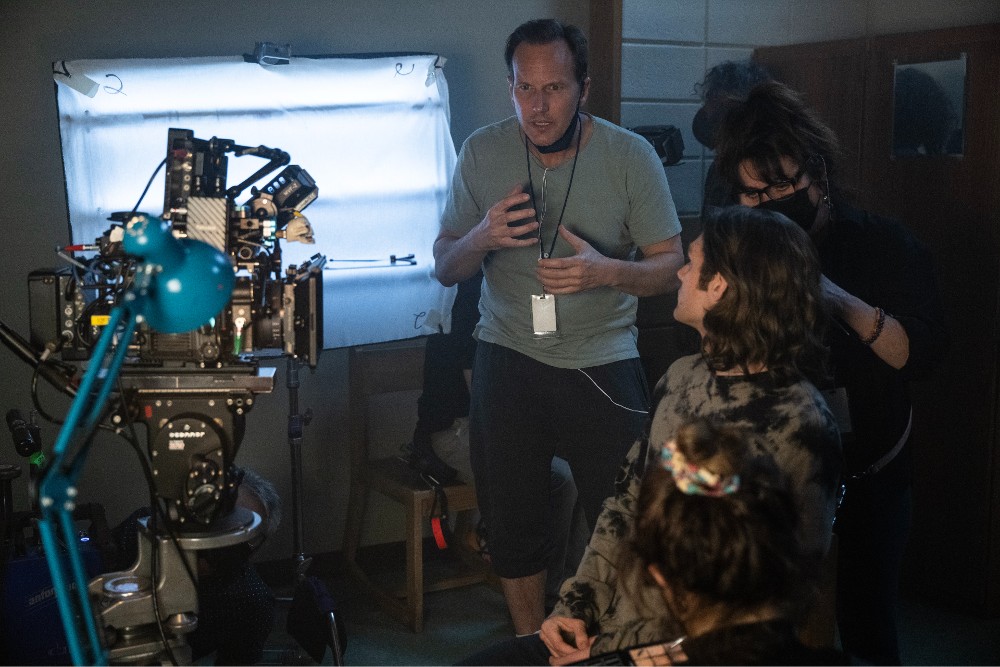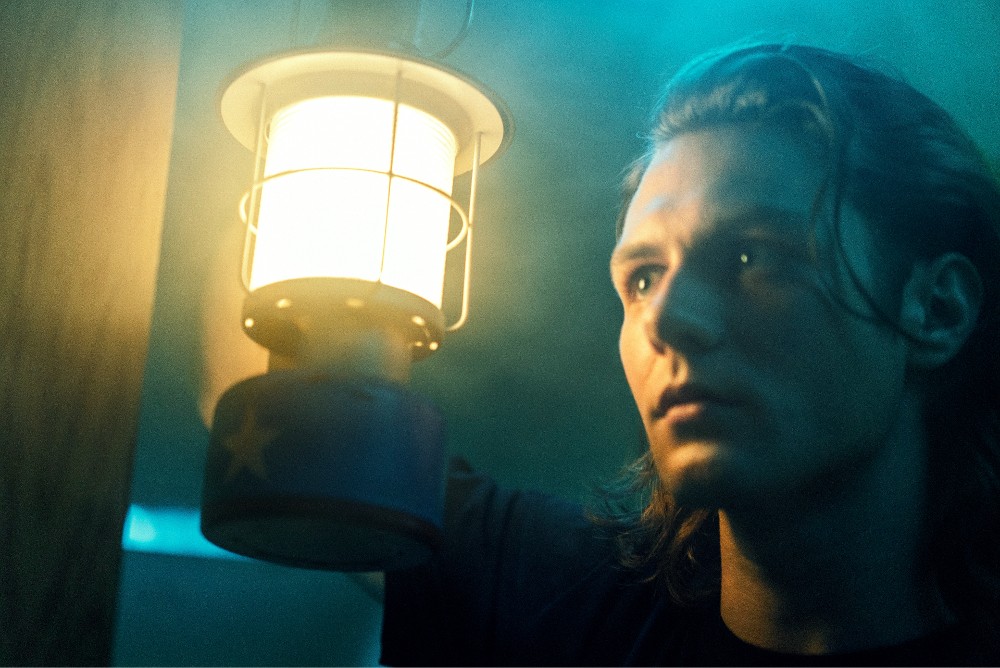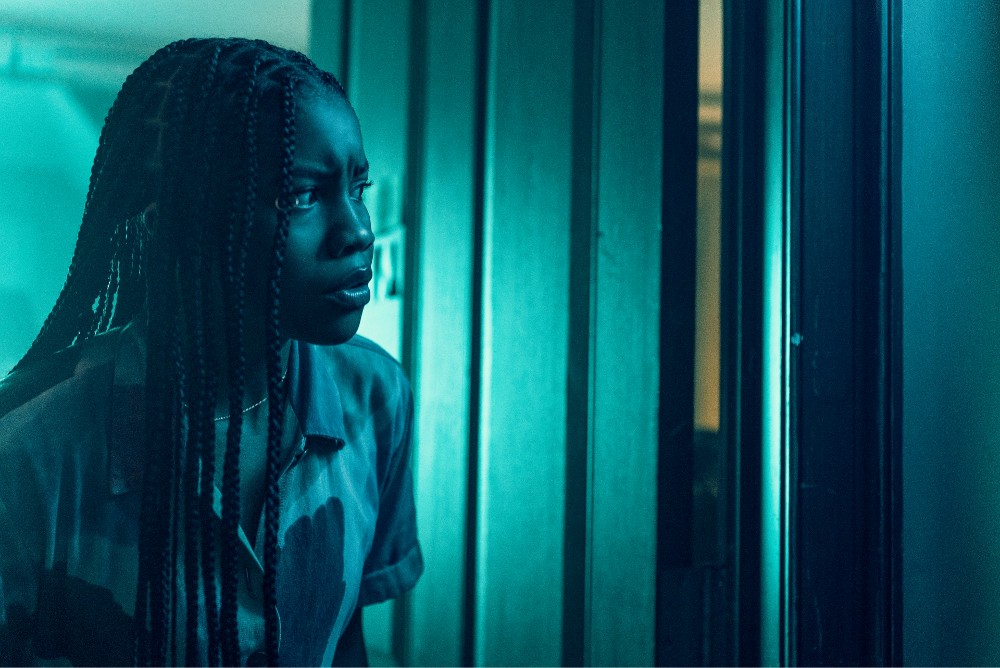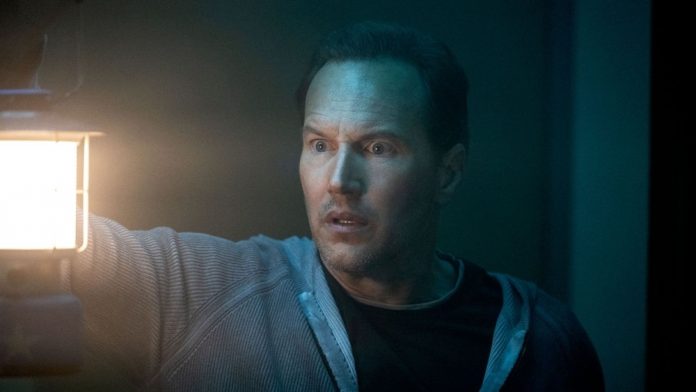For actor Patrick Wilson, the original Insidious movie in 2010 may have just been another job at the time, one that found him collaborating with director James Wan, screenwriter Leigh Whannell, and actress Rose Byrne — though it has since become so much more. That film didn’t just lead to Wilson starring in Wan’s Conjuring and Aquaman franchises, it also led him to make his directorial debut with the fifth installment of the long-running horror franchise, Insidious: The Red Door.
Indeed, Wilson performs double duty on the sequel, in which he once again reprises the role of Josh Lambert, whose family has encountered supernatural demons within a mystical realm called the Further. In The Red Door, Wilson’s Josh has returned from the Further, though it returns to infiltrate his life and that of his son, Dalton (Ty Simpkins), who is heading off to college. Byrne’s Renai Lambert even comes back for a couple of scenes.
Above the Line spoke with Wilson over Zoom about his experiences as a first-time director, how the sequel came about, working with Simpkins in a different capacity, and franchise addition Sinclair Daniel, who plays Dalton’s new college roommate, Chris.

Above the Line: For whatever reason, I end up talking to many actors when they make their directorial debuts. This is an interesting case because you starred in the first two Insidious movies, and then you went on to star in James Wan’s Conjuring franchise, too. So how did The Red Door come about, and why was now the right time to both step behind the camera, and to bring back the Lamberts, which I’m not sure anyone was expecting to ever happen?
Patrick Wilson: The script wasn’t written yet, because I don’t think they knew if the Lamberts were going to come back — and by Lamberts, I mean, me and Rose Byrne. Leigh [Whannell] had a kernel of an idea — the story of Dalton going to a Northeastern college far, far from L.A., and then something happens, and blah, blah, blah, blah, we’re back into the Further. Josh was in there for a couple scenes.
They pitched that to my agents, and my agent, before they even sent it to me, said to them, ‘What if he directs it?’ So it was my agent that actually had the idea because he knew [that] I’ve been looking for things to direct. And then, either Jason [Blum] or Couper [Samuelson] at Blumhouse said, ‘Why didn’t we think of that? That’s perfect! Sure, if he wants to do it, that’s a great idea.’ [So], it seemed like a perfect fit.
By the time it was pitched to me, it was, ‘Hey, they want you to be in it a little, but would you direct it?’ First, I thought, “Oh, gosh, I don’t know if I want to try to fill James’ shoes. I don’t know,” and then after about a day, I thought, “You’re an idiot for even questioning this. What a gift.”
It’s the fifth movie of a franchise, so in some ways, the slate is clean. Very few ” [Part] 5″ movies reinvent the wheel. You’re dealing with characters that you’ve known, and I started to think about it, and I thought, “This is a story that I would like to tell. I would need to address what happened in the second movie. I’d want to make, like, the Lambert trilogy.” I have such respect, obviously, for James and Leigh, and what we did in the first two movies, that I would want this to fit into that trilogy, but to pave new road. I thought of some ideas for [the] story, and then I pitched [those] back to them, and they said, ‘Great.’
[Screenwriter] Scott Teems and I sat down because we just wanted a whole different feel, and Scott went away and wrote it. I knew I wanted Ty. I had a feeling I could track down Andrew [Astor], who played Foster, but I didn’t know if he was even acting anymore, and I called Rose, [who] wasn’t in the original pitch. I knew I was going to shoot it in New Jersey, where I live. She lives in New York, so I knew that was a big bonus for actors — to be able to work at home. I know, as a parent, if you don’t have to travel, you don’t want to.
I called her and I said, ‘Listen, there is a world where I do this movie without [Byrne’s character] Renai. I just don’t want to be in that world. I don’t need a lot, but I want to unpack what happened in the second movie, which means I need to look to you and go, ‘Why did you lie to me?’ I need that scene.’ It’s definitely a father-son movie, and [Ty and I] share the bulk of the load, and that was always by design. But I needed those moments, and she said, ‘Absolutely,’ so we just made it work. It was really a great, great, great creative process for the past four years.
ATL: I spoke to Jason Bateman for his directorial debut a few years back, and he told me something that stuck with me — that he likes to act in movies and shows he directs so that he can use his skills as an actor to direct the other actors. In this movie, you have many scenes by yourself, but you also have a whole section with Ty where you’re just directing him and others. Which do you prefer? Do you find it easier to direct while acting in scenes?
Wilson: That’s interesting. I would love to talk to him about that because I find that more difficult, depending on the person you’re working with. I am so old-school [and] from the theater. Like, you don’t direct another actor, as an actor. Even if I’m stepping on your line, don’t tell me. Go to the director. It’s so ingrained in my blood. It’s different [for] a younger actor. I feel like the relationship’s a little easier. But I’m not going to finish a scene with Rose Byrne and say, ‘That’s great. Next time, do it like this.’ The last thing you want from me, [and] the last thing I want my scene partners to feel is, “My scene partner is judging me.”
I don’t want to direct while I’m acting, that’s not fair to the scene. I usually had to kind of separate myself a little bit, [and] sometimes even walk away, look at the take, [and go,] ‘Is what I’m feeling what I’m seeing?’ [So I’m] making sure [it does], and then coming back and talking about it, saying, ‘Let’s try this. What about this?’
I really liked the camaraderie of it all. I’m certainly not saying anything against Jason — I think that’s an interesting perspective. Again, as a theater guy, you’re used to just drilling scenes over and over and over, [and] rehearsing for hours. I have no problem doing it a million different ways — that’s easy, to me — but actually giving another actor direction as the actor? That’s a little tricky, depending on the relationship…

ATL: It must have been wild to work with Ty again. I can’t even believe he’s the same kid from the first couple of Insidious movies and Jurassic World. He’s changed so much physically… was that true of him as an actor as well, given how long it’s been since you last worked with him?
Wilson: Oh, yeah, but to be fair — this will be a funny quote, perhaps offensive — working with kids is sometimes like working with animals [in that] you just want to shape them [and] get them to look a certain way. Maybe they can say some dialogue — not that animals would (though I suppose depends on the movie) — but you’re not trying to direct a kid like you typically would an adult.
Obviously, there are exceptions to that. My son, when he was on the show Prodigal Son, the directors were very surprised [they] didn’t have to direct him as a kid. [They] could talk to him as an actor. Most kids, you actually do just have to say, “Now say it like this. Can you look over there?” You’re not really getting into what the scene’s about.
To be fair, I didn’t know Ty as an actor, really. He was fine, a lovely kid, such a sweet, wonderful face, and I adore [his] family — I’ve known him since he was three. I was less concerned about what he was like as an actor. I knew he’d been working. I’d seen Jurassic World and Iron Man 3. I know he knows his way around the set [and] I know he’s comfortable, [so] I knew all that stuff.
I didn’t need him to audition, [but] I wanted to see if he wanted it. “Do you have that hustle? Do you have that fire? Are you willing to go really deep?” I told him, ‘This is not going to be easy, [but] it will be rewarding. I can’t say it’s going to be fun, the amount of trauma that this character goes through.’ He read it, loved it, and was so game.
Honestly, that’s all I cared about. I knew I could get to him as a person. I really did. I felt confident. I’ve worked with enough younger actors over the years that I knew I could find my language with him. I knew he was game for it, and that’s all I wanted — just an open, honest, and earnest ability to dive right in. He was game for that, and I think he did a spectacular job.
ATL: How about putting together your heads of department? As an actor, you’ve worked closely with the costume department as well as hair and makeup over the course of your career, but what about finding an editor or a production designer? I also noticed that your production designer didn’t work on any of the previous Insidious movies either…
Wilson: That’s great. You’re the first person [who’s] asked all that stuff. Adam Reamer was our production designer, and I knew Adam’s work from TV shows that he had done, so I knew he could move quickly. I knew he was very creative. Autumn Eakin, our DP, I was just looking at reels. I really just wanted diversity. I did. I wanted female heads of department. I wanted people of color [as] heads of department. Dajia Milan, our costume designer, she’d never done any Insidious movies, but she had been working on Wu-Tang Chronicles, and I talked to her, and she says, ‘I’m such a massive Insidious fan.’ She really wanted it, and I was like, ‘Great, Let’s do it.’
I wanted the cast and the crew to reflect the world that I want to live in, [and] that I do live in. I live in a very diverse community, and I wanted that. Typically, a lot of these movies seem very… well, [they] seem very white. I didn’t want that, I really didn’t. I wanted the cast and the crew to reflect the kind of environment that I feel enjoys these movies and their stories, [which] I want to tell. All [of] that has to be very on purpose, honestly.

ATL: That sounds like a good segue to ask about Sinclair Daniel, who is amazing as Chris, and very funny as well. I’m not sure if she’s done a lot before, so how did you find her?
Wilson: I know, isn’t she awesome? I auditioned so many young women, and when it got down to it, there were three girls [who] were so good, they all would have been fantastic in this movie. I mean that. She just had something. I had a feeling I was going to end up with a young actress from theater school. I just knew it. I wanted that as a balance to Ty, knowing the workload that this takes [and the fact that] I knew I was not going to have a lot of takes with each person.
It’s a tall order, right? She’s got to be… sure, likable, [have] chemistry, all that kind of stuff, but she’s [also] got to be the comic relief. She’s got to really be the audience’s eyes and ears into the movie because this family is very troubled and is hiding things from each other. We need one person [who] is just our eyes and ears. She’s our way in, and she’s also got to be put in peril.
She’s awesome. You gotta be in a horror movie, a comedy, a romantic drama, and an adult drama. Oh, and you gotta be young. To me, that’s a theater-trained actress. [Those are] the requirements, and yes, I’m saying that as a theater-trained actor. Someone [who has] gone to school [and] has been through the wringer at school [and] knows what that’s like. She auditioned, and we found her and she’s incredible. There wasn’t a bad take of hers that I left on the floor. Everything that she shot, I could use, and that’s a huge, compliment. She was a great resource for Ty as well. The fact that she’s just a couple of years older, I thought, played well with their relationship [and] with what he’s going through. It was all about just trying to match chemistry.
I think of what Mike Nichols told me 20 years ago, which was, ’80 percent of what I do is casting.’ Scott really wrote some great dialogue for Chris when we created this character, [and] we knew it was going to be a much different feel than [previous] Insidious movies. It made us happy, and seeing how audiences react to her is just the icing on top of the cake.
ATL: You didn’t just have to deal with directing your first movie, you also had to do it under COVID protocols, which have thrown off even the most seasoned and experienced filmmakers. How was it for you? I’m not sure if you were doing much acting during the height of the pandemic, or if you were more focused on getting this movie up and running.
Wilson: Aquaman 2 was still during that time, [though it wasn’t] as bad because that was a little later. Moonfall, I did with Roland Emmerich [at] the height of it, in Canada, which was just brutal. I didn’t see the crew’s faces for three months. Yeah, I hated that, I’m not gonna lie. I loved shooting the movie, but the COVID protocols… [and] yes, I get all of that, but it’s difficult when you’re in a business about faces and contact.
We’re not accountants — nothing against accountants, we all need them — but it wasn’t great. It was difficult. The saving grace was, as an actor, you’re in Zone A — at that point, you don’t have to wear the mask. Typically, when I was acting, I wouldn’t have to wear [a] mask. When I was just directing, I had to wear a mask. It didn’t make any sense — I’m not gonna lie to you — because I’m the same person [and] I’m doing the same stuff every day. It’s just [that] today, I’m not wearing makeup, so I have to wear a mask. Okay… not sure how that makes sense… but it is what it is. We all got through it.
Sony’s Screen Gems label will release Insidious: The Red Door in theaters nationwide on Friday, July 7, with previews starting on Thursday night.



